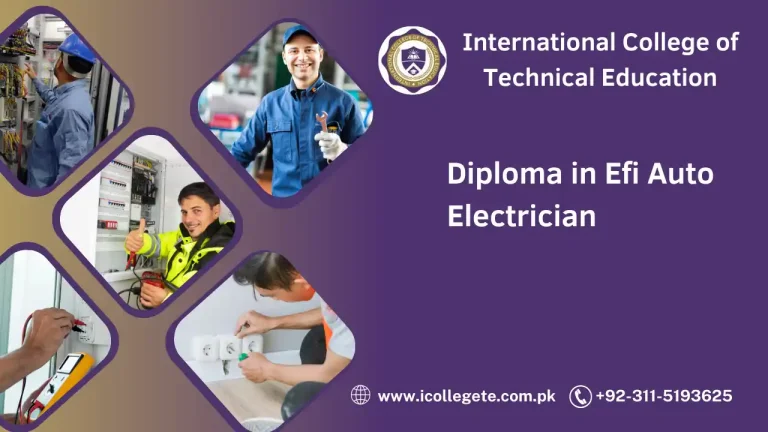The EFI Auto Electrician Training Program is designed to equip individuals with the necessary knowledge and skills to excel in the field of automotive electronics, specifically focusing on Electronic Fuel Injection (EFI) systems. The course covers a comprehensive range of topics, from the fundamentals of automotive electrical systems to advanced EFI diagnostics and troubleshooting techniques. Through a combination of theoretical lessons and hands-on practical training, participants will gain a deep understanding of EFI technology and its integration into modern vehicles.
Course Benefits:
- In-Demand Skillset: With the increasing complexity of automotive electronics, skilled EFI auto electricians are in high demand by both automotive repair shops and dealerships.
- Career Opportunities: Graduates of this course will be well-prepared to pursue careers as EFI technicians, automotive electricians, and diagnostic specialists.
- Hands-On Experience: Practical training sessions using real EFI systems and diagnostic tools ensure that students are job-ready upon completion.
- Comprehensive Curriculum: The curriculum covers both foundational knowledge and advanced techniques, providing a holistic understanding of EFI systems.
- Industry-Relevant Learning: The course content is aligned with industry standards and emerging trends, ensuring graduates stay relevant in a rapidly evolving field.
Course Learning Outcomes:
By the end of the course, participants will be able to:
- Explain the principles of EFI technology and its significance in modern vehicles.
- Understand the components of EFI systems and their functions within the vehicle’s powertrain.
- Diagnose and repair common EFI system issues, including sensor and actuator failures.
- Interpret diagnostic trouble codes (DTCs) and implement effective troubleshooting strategies.
- Utilize specialized diagnostic tools and equipment to diagnose and rectify EFI-related problems.
- Perform electrical system testing and analysis to identify circuit faults and connectivity issues.
- Demonstrate proficiency in using oscilloscopes, multimeters, and scan tools for accurate diagnostics.
- Install, calibrate, and adjust EFI components to optimize engine performance and emissions.
- Implement safety practices while working with automotive electrical systems and high-voltage components.
- Communicate effectively with customers and colleagues regarding EFI system diagnoses and repair recommendations.
Course Study Units:
- Introduction to Automotive Electronics and EFI Systems:
- Overview of automotive electrical systems
- Evolution of EFI technology
- Benefits and challenges of EFI systems
- EFI System Components and Functions:
- Fuel injectors, sensors, and actuators
- Throttle bodies and air intake systems
- Engine control modules (ECMs) and electronic circuits
- EFI System Diagnostics and Troubleshooting:
- Reading and interpreting DTCs
- Common EFI system problems and solutions
- Hands-on troubleshooting exercises
- Diagnostic Tools and Equipment:
- Scan tools, oscilloscopes, and multimeters
- Using diagnostic software for system analysis
- Data interpretation and analysis techniques
- Electrical System Testing and Analysis:
- Circuit testing methods
- Voltage drop testing and current analysis
- Identifying short circuits and open circuits
- EFI System Installation and Calibration:
- Installation of EFI components
- Throttle position sensor calibration
- Fuel injector timing and synchronization
- Safety Practices and Precautions:
- Handling high-voltage components safely
- Personal protective equipment (PPE) requirements
- Environmental considerations
Entry Requirements:
- Basic understanding of automotive systems and components
- High school diploma or equivalent
- Interest in automotive electronics and a desire to learn EFI technology
- Strong problem-solving skills and attention to detail
Future Progressions: Upon successful completion of the EFI Auto Electrician Training Program, graduates can explore various avenues for career advancement and specialization:
- Master EFI Technician: Acquire advanced certifications and specialize in diagnosing complex EFI issues.
- Automotive Electronics Engineer: Pursue higher education in electrical engineering and contribute to automotive electronics research and development.
- Diagnostic Tool Development: Work with automotive tool manufacturers to design and improve diagnostic equipment.
- Entrepreneurship: Start an independent auto repair business specializing in EFI diagnostics and repair.
- Teaching and Training: Share acquired knowledge by becoming an instructor in EFI technology at vocational schools or training centers.
Conclusion:
the EFI Auto Electrician Training Program offers a comprehensive curriculum that combines theoretical knowledge and hands-on experience to prepare individuals for a rewarding career in the field of automotive electronics. This program not only imparts the skills required to diagnose and repair EFI systems but also equips students with the foundation to excel in an ever-evolving automotive industry.






